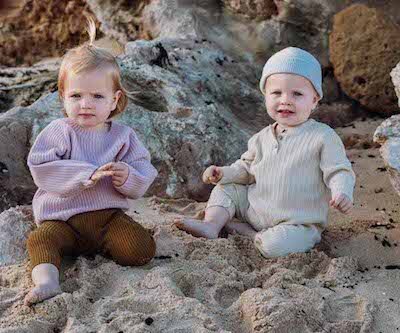
Why Babies Should Wear Merino
We talk a lot about merino here at Bambini.
Merino wool has been used for thousands of years and remains one of the world's most well-known, best-quality natural fibres. Soft, versatile, renewable, sustainable, no synthetic fabric can come close to merino’s goodness.
What is merino wool?
This natural wool fibre grows year-round on the Merino sheep.
The superfine merino used in our ranges here at Bambini is from free ranging sheep in New Zealand and Australia.
Compared with synthetics and many other fabrics, merino is one of the most sustainable fibres with one of the lightest carbon footprints. No need for chemicals, irrigation and the related ecosystem disruption - all the sheep need is sun, rain, grass, and fresh air to grow healthy wool.
Merino fabric creates a microclimate that buffers against changes in external conditions. It is also deliciously warm and luxurious to wear, ultra-soft and gentle on babies' skin.
Properties of merino wool
What makes merino so special? Here are some of the properties that make it one of the best materials to clothe your baby:
Temperature control
The early hours of the morning can get chilly for everybody, and it is extra important to consider how to support temperature regulation in our babies. Since their bodies do not yet have the full capacity to regulate temperature, newborns often wake up at night too hot or too cold.
Merino bodysuits are the perfect solution.
Merino fibre has the unique ability to compensate for this, capturing air that will insulate bubs when it gets cold. Because merino is also highly breathable, when the room temperature rises, the fabric will release any excess moisture and body heat. Unlike cotton, it will not get clammy or damp and helps to wick moisture away from the skin.
Merino fibres create air pockets that function as natural insulators. These keep babies warm without compromising breathability - and that’s the secret to merino’s incredible temperature regulation. Day or night, all year round, merino will help prevent your baby from getting too cold or overheating.
Flame resistant and moisture wicking
Merino is like a super-fabric when it comes to protecting your baby.
Thanks to its high water absorption and unique chemical composition, it is one of the least flammable fibres, requires a higher temperature to combust, is easier to extinguish, and is far slower to burn than polyester or nylon.
As a
hygroscopic fibre, merino, uniquely, can absorb moisture vapour from the environment while repelling liquids. It will absorb more than 30% of its weight in water before feeling damp and has a regain factor (how much water in the fibre as a percentage of its dry weight) up to 17 times higher than that of synthetic fabrics.
Both of these abilities work wonders in keeping your baby comfortable.
Easy cleaning
As a parent, you are undoubtedly looking for any way you can minimise cleaning. Merino, blessedly, does not require frequent or intensive washing. Keep the fabric fresh by airing it out each day. Many parents only wash their baby merino every few weeks, or in the event of a nappy explosion!
Merino is naturally resistant to odour, bacteria, and soiling. Whereas synthetic fibres attract and retain oil and stain easily, the natural water-repellant surface of merino means you get more time to wipe away spills before they cause a permanent stain. Merino also dries quickly - so you can wash and have it ready to wear on the same day.
These properties make merino the ideal choice for busy parents! It's also a great fabric for us grownups, with that natural protective layer repelling perspiration and odour, so we get more wear out of our merino layers too,
Great for skin sensitivity
A layer of merino beside the skin will provide sufficient warmth without overheating. Since merino also helps keep your baby dry, it also avoids the issue of rashes that can come from prolonged exposure to sweat.
The silky-soft feel of merino is unlike any other wool, making it one of the best materials for baby’s skin - even little ones that suffer from eczema. However, this is not always the case, so you might want to try starting with mittens, booties or
Lamington baby socks in case your bub’s skin reacts.
More sustainable
Merino wool ticks all the boxes when it comes to sustainability: it is renewable, recyclable, and biodegradable.
By nature, wool is a 100% circular fibre. As it is biodegradable, it does not contribute to
microplastic pollution and it is one of the most reused and recyclable fibres in the world.
Where to get quality merino for babies
Here at Bambini, our hand-picked range of clothing for babies includes some of the best quality merino products available. We work with highly ethical and sustainable brands that are committed to doing right by you and your baby.
Explore our selection of
merino socks, blankets, jerseys, and more today.